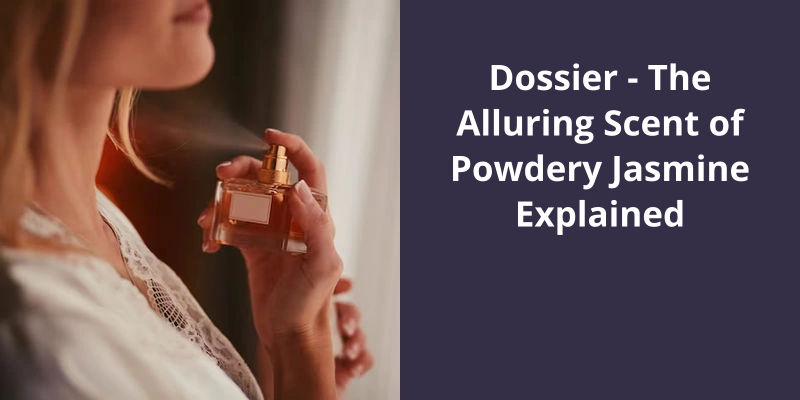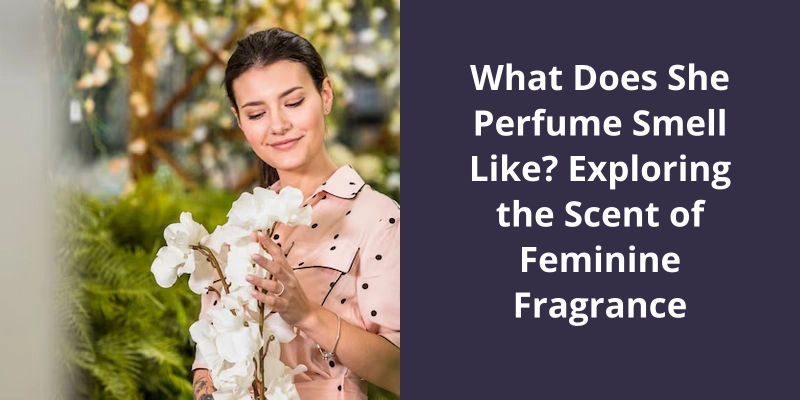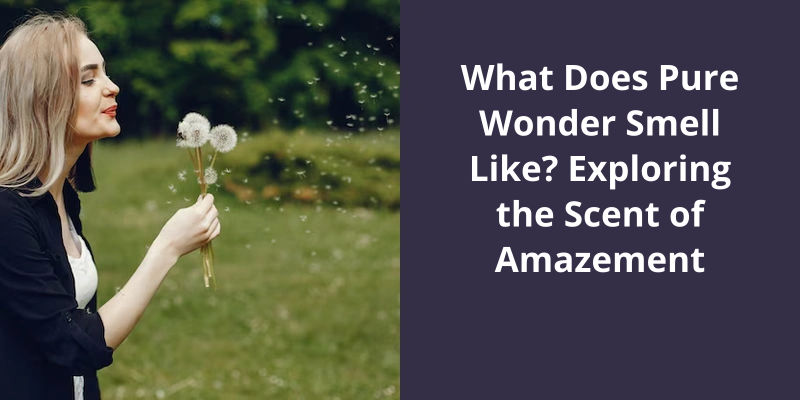Known for it’s intoxicating floral aroma, jasmine has long held a prominent place in various cultures and traditions, evoking images of opulent gardens and moonlit nights.

What Does the Scent of Jasmine Smell Like?
Jasmines scent is often described as a captivating and enchanting aroma. When one encounters the scent of jasmine, they’re immediately greeted with a complex blend of green, fruity top notes that create a refreshing and invigorating sensation. These top notes give a sense of liveliness and vibrancy, setting the stage for the rich olfactory experience that’s to follow.
As the scent lingers, the middle notes of true jasmine blossom fully reveal themselves. These middle notes are the heart and soul of jasmines fragrance, exuding an intense floral bouquet that’s both intoxicating and sensual. It’s during this phase that the true beauty of jasmine comes to life, enveloping the senses in a warm and heady embrace.
Furthermore, the powdery undertones of jasmine add depth and sophistication to it’s overall scent profile. These powdery notes lend a sense of elegance and refinement to the fragrance, further enhancing it’s allure. The interplay between the floral and powdery aspects creates a harmonious and balanced aroma that’s both alluring and comforting.
It’s a captivating scent that embodies both the delicate beauty of flowers and the allure of exoticism, making it a timeless and enchanting fragrance for all to enjoy.
History of Jasmine Fragrance: Explore the Origins and Cultural Significance of Jasmine as a Perfume Ingredient.
The history of jasmine fragrance dates back centuries, with it’s origins rooted in ancient cultures and traditions. Jasmine, known for it’s intoxicating aroma, has held great cultural significance as a perfume ingredient throughout history.
Originating in Persia (modern-day Iran), jasmine was highly revered and valued for it’s enchanting scent. The popularity of jasmine quickly spread to other regions, including India and China, where it became an essential component of traditional perfumes and beauty rituals.
In many Asian countries, jasmine has symbolic associations with purity, love, and sensuality. It’s often used in religious ceremonies, weddings, and celebrations to create a serene and romantic ambiance.
During the Islamic Golden Age, the art of perfumery flourished, and jasmine became a sought-after ingredient in Arab culture. Perfume makers perfected the extraction techniques, resulting in exquisite jasmine essential oils and attars.
As trade routes expanded, jasmine fragrance made it’s way to Europe, captivating the olfactory senses of the elite. The allure of the scent led to the establishment of jasmine plantations in countries such as France and Italy.
Since then, jasmine continues to be a beloved fragrance note in the world of perfumery. It’s powdery, floral aroma adds a touch of elegance and sensuality to countless perfumes, making it a timeless and alluring scent.
In conclusion, the history of jasmine fragrance unveils a captivating journey that spans across cultures and centuries, showcasing it’s profound cultural significance and enduring appeal as a perfume ingredient.
Jasmine, known for it’s sensual and intoxicating scent, is often described as having a slightly musky and powdery nuance in it’s base notes. However, the aroma of jasmine can vary depending on it’s origin and extraction method, showcasing it’s subtle nuances.
Is Jasmine a Powdery Scent?
Jasmine, often celebrated for it’s alluring scent, holds a special place in the world of fragrances. When it comes to describing jasmine as a powdery scent, it’s important to consider the base notes that contribute to it’s overall olfactory profile. While jasmine itself is predominantly floral in nature, the addition of other base notes lends it a powdery nuance.
What makes jasmine even more fascinating is it’s ability to possess subtle nuances. These nuances can vary depending on the origin of jasmine and the method of extraction. For example, jasmine sourced from India may have a sweeter and more intense aroma, while jasmine from Egypt may have a softer and more delicate scent.
Different extraction methods, such as solvent extraction or enfleurage, can also influence the final scent of jasmine.
The History and Cultural Significance of Jasmine in Fragrance
Jasmine has a rich history and holds immense cultural significance in the world of fragrance. The mesmerizing scent of jasmine has been cherished for centuries and has found it’s way into countless perfumes, skincare products, and even teas.
Originating from Asia, jasmine has been cultivated and cherished for over 4,000 years. It was highly valued in ancient civilizations like Egypt, where it was used in religious ceremonies and as a symbol of love and beauty. In India, jasmine flowers are an essential part of wedding rituals and are often used to adorn the bride’s hair.
When it comes to perfumery, jasmine is considered one of the most prized and alluring floral notes. It’s known for it’s delicate, sweet, and powdery aroma that adds depth, sensuality, and elegance to a fragrance composition. Jasmine is also valued for it’s versatility, as it pairs well with other floral notes like rose or tuberose, as well as with citrus or woody accords.
Whether used as a single note or combined with other ingredients, jasmine brings a touch of sophistication and luxury to any fragrance. It’s intoxicating scent has the power to evoke feelings of romance, seduction, and pure joy. It’s no wonder that jasmine remains a cherished and sought-after ingredient in perfumery to this day.
If you’re in search of a perfume that captures the captivating scent of jasmine, look no further than Sana Jardin’s Savage Jasmine Eau de Parfum. This fragrance is known for it’s enchanting floral notes that closely resemble the aroma of fresh jasmine blossoms. Another option to explore is Nest New York’s Indian Jasmine Perfume Oil, which also offers a rich and authentic jasmine scent. For a unique twist, consider D.S. & Durga’s Jazmín Yucatan Eau de Parfum, Guerlain’s Jasmin Bonheur Eau De Parfum, or Byredo’s Flowerhead Eau de Parfum, each adding their own interpretation of the exquisite jasmine fragrance. And for those who prefer a blend of floral and fruity scents, Dior’s Jasmin des Anges Eau de Parfum and Gucci’s Flora Gorgeous Jasmine Eau de Parfum deliver a delightful combination. Explore these options and discover the perfect jasmine fragrance that suits your style.
Which Perfume Smells Exactly Like Jasmine?
In the world of perfumes, few scents possess the captivating allure of powdery jasmine. It’s intoxicating floral aroma has entranced countless individuals throughout history, making it a sought-after note in perfumery. When searching for a perfume that captures the essence of jasmine, one fragrance that stands out is Sana Jardin Savage Jasmine Eau de Parfum. This fragrance showcases the true beauty of jasmine, with it’s delicate and sensual composition that lingers on the skin.
Another perfume that perfectly captures the essence of jasmine is Nest New York Indian Jasmine Perfume Oil. This luxurious oil is infused with the rich and heady scent of jasmine, enveloping the wearer in it’s irresistible aura. The oil format allows for a more intimate and personal application, ensuring that the jasmine note truly shines.
For those who prefer a more unique and exotic take on jasmine, D.S. & Durga Jazmn Yucatan Eau de Parfum is an excellent choice. This fragrance combines the captivating scent of jasmine with notes of ylang-ylang and tuberose, creating a complex and alluring olfactory experience.
Guerlain Jasmin Bonheur Eau De Parfum is another exquisite fragrance that captures the essence of powdery jasmine. This elegant perfume combines jasmine with warm and comforting notes of sandalwood, creating a sophisticated and luxurious scent that’s perfect for any occasion.
Byredo Flowerhead Eau de Parfum offers a modern and contemporary take on jasmine.
Lastly, Dior Jasmin des Anges Eau de Parfum is a fragrance that celebrates the true beauty of jasmine.
The History and Cultural Significance of Jasmine in Perfumery
Jasmine, known for it’s captivating fragrance, has a rich history and holds significant cultural importance in the world of perfumery. This delicate flower has been cherished for centuries and is often associated with femininity, sensuality, and elegance.
The use of jasmine in perfumes can be traced back to ancient civilizations. In ancient Egypt, jasmine was highly valued and often used in the production of sacred oils and perfumes for religious ceremonies. It’s heavenly scent was believed to have spiritual and romantic properties.
During the Renaissance period in Europe, jasmine gained popularity among the elite and was considered a symbol of luxury and sophistication. It’s alluring aroma captivated the senses and became a key ingredient in many extravagant fragrances.
Today, jasmine continues to play a prominent role in the perfume industry. The extraction of jasmine oil requires delicate and time-consuming processes, making it one of the most expensive and sought-after natural essences used in perfumery. It’s heady and powdery scent blends seamlessly with other notes, adding depth and complexity to fragrances.
Furthermore, jasmine’s cultural significance extends beyond it’s use in perfumes. It’s often associated with love, purity, and beauty in various cultures around the world. In India, jasmine garlands are commonly worn as a symbol of prosperity and are offered as auspicious gifts during festivals and weddings. In China, jasmine tea is a popular beverage with a delicate floral aroma.
In conclusion, the allure of powdery jasmine in perfumery isn’t only rooted in it’s captivating scent but also in it’s storied history and cultural significance. This enchanting flower continues to mesmerize and inspire perfumers, creating timeless fragrances that evoke a sense of beauty and sensuality.
Conclusion
In conclusion, the captivating allure of powdery jasmine is an intricate dance between delicate floral notes and warm, inviting undertones. This dossier has explored the fascinating components that contribute to the complexity of powdery jasmine, from it’s natural chemical compounds to it’s historical significance in perfumery.




